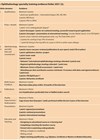
The FRCOphth Part 1 exam is a difficult exam with an average pass rate of 46% in the last year. It is a requirement before entry into the third year of ophthalmology specialty training (OST). Passing this exam during foundation years awards extra points in the portfolio section of OST application in the UK.
This exam assesses the learning outcomes from the curriculum of the first two years of OST, including basic sciences relevant to ophthalmology, anatomy, optics, instrument technology and pathology.

Due to the COVID-19 pandemic, this exam has been adapted to an Online Proctored Examination. The structure of the exam had also been recently changed into two MCQ papers of two hours, each with a one-hour break in between. More information about the format of this and tips on how to handle it are summarised in another Eye News article https://www.eyenews.uk.com/education/specialty-trainee/post/tips-for-the-online-proctored-frcophth-part-1
There is an abundance of resources available for the FRCOphth Part 1 exam revision. I have summarised below the ones I found most helpful.
Textbooks
- Clinical Anatomy of the Eye by Snell and Lemp is an excellent book and maps well to the anatomy part of the syllabus. It covers most of the anatomy needed.
- Clinical Optics by Elkington was my go-to book for optics. It covers most topics in optics with many good diagrams. Although sometimes optic questions can go beyond the scope of this book.
- The Eye: Basic Sciences in Practice by Forrester was a helpful book but quite long. If there is limited time, the following chapters: Anatomy, Embryology and Pathology tend to be the most useful for part 1 exam revision.
- Basic and Clinical Science course by American Academy of Ophthalmology is a series of books covering various aspects of ophthalmology. I mainly used it as a reference book to look up specific topics that I did not fully understand from reading other books or doing questions. It has a good section on clinical optics and supplements Elkington quite well.
- Oxford Handbook of Ophthalmology can be used for some clinical background information but not essential as the part 1 exam mainly focuses on the basic sciences, anatomy and optics.
- Kanski’s Clinical Ophthalmology: A Systematic Approach by Salmon is useful, especially for investigations and instruments.
Online question banks
- FRCOphth sample questions are available on the Royal College of Ophthalmologists website. It contains 50 sample MCQ questions with answers released by Examinations Committee from the Part 1 question bank and could be used as a timed self-test closer to the exam date.
- Eyedocs is a website with a Part 1 MCQ question bank containing more than 2000 questions for practice. The questions are of average difficulty of those in the actual exam. Each question comes with an answer and explanations, which are helpful to go through. I found the questions on statistics quite useful and closely resemble the ones in the actual exam. Eyedocs also has a forum about the Part 1 exam and many useful experiences and recommendations from people who passed the exam can be found there.
- EFRCOphth is a recently developed online MCQ question bank containing about 1200 practice MCQ questions. Currently, it is free to use.
- Chua website (http://www.mrcophth.com/chua1.html) is a free website with MCQ question banks originally aimed at MRCOphth and information on a variety of topics. The investigations and pathology sections are particularly helpful for Part 1.
Question books
- FRCOphth Part 1: 400 SBAs and CRQs by Hall and Peden was an instrumental book for practising MCQs. It closely resembles the actual exam questions and also provides explanations to each question, and summarises the useful learning points well.
- MCQs for FRCOphth and ICO Basic Sciences Examinations by Trikha contains MCQ and T/F questions for practice.
Other useful resources
- Dr Hunter’s 2020 Optics and Refraction Review is a six-hour video lecture by Professor David Hunter focusing on the basics of optics and refraction. I found it greatly helpful as a starting point for studying optics. It is available on Youtube.
- https://25admissions.wordpress.com/ This website provides a set of study notes prepared by an ophthalmologist specifically for the Part 1 exam. It is divided into many different sections and provides lots of high-yield knowledge points.
- http://www.medrounds.org/optics-review/ is a useful website for optics.
- FRCOphth Part 1 Reviseaid APP contains 120 MCQ questions which are of high quality and come with answers and explanations.
- FRCOphth Part 1 Revision Course by Moorfields Education and UCL Institute of Ophthalmology is a four-day online revision course that aims to cover the main topics examined by the Part 1 exam. It contains pre-recorded lectures and daily live Q&A sessions with the lecturers. This course is particularly good for those who find it easier to learn by listening to lectures rather than reading on their own.
- Eyewiki website by the American Academy of Ophthalmology is helpful for looking up specific clinical conditions and is also good for some investigations.
Overall, the revision period may take about three to four months, and it might be good to take study leave closer to the exam date to do timed MCQ practices. Hopefully, the above resources should help your revision go smoothly. Best of luck!
Declaration of competing interests: None declared.
COMMENTS ARE WELCOME











